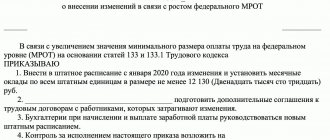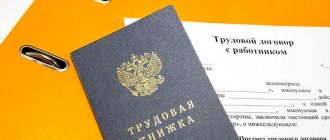Job description of a pediatrician
[organizational and legal form, name of organization, enterprise]
[position, signature, full name of the manager or other official authorized to approve the job description]
[day month Year]
Job description of a pediatrician
[name of organization, enterprise, etc.]
This job description has been developed and approved in accordance with the provisions of the Labor Code of the Russian Federation, the Unified Qualification Directory of Positions of Managers, Specialists and Employees, section “Qualification characteristics of positions of employees in the healthcare sector”, approved by the Order of the Ministry of Health and Social Development of the Russian Federation dated July 23, 2010. N 541n, and other legal acts regulating labor relations.
https://youtu.be/uBDiEE5rDnU
General characteristics of the professional standard and generalized labor function
The professional standard “Local pediatrician” was developed as a replacement for the professional standard “Pediatrics Specialist”, which became invalid on the day the new standard came into force – April 29, 2017. Analyzing the professional standard “Physician-Pediatrician”, we will compare it not only with the previous version of the standard, but also with the professional standard “Physician-Physician (Physician-Physician)”, approved by the Ministry of Health almost at the same time – March 21, 2017. The mentioned standard has already been analyzed by us in the article “Professional standard “Physician (precinct physician)” and its features.” These standards have many very similar norms and many similar shortcomings.
So, for example, in the professional standard “District Pediatrician,” the main goal of the activity of a local pediatrician is defined as “preserving and strengthening the health of children” (by analogy with “preserving and strengthening the health of the adult population” in the professional standard of a local pediatrician). As we have already noted, such a name cannot be considered correct, since the wording “preservation and promotion of health” is borrowed from paragraph 5 of Article 12 of the Federal Law of November 21, 2011 No. 323-FZ “On the fundamentals of protecting the health of citizens in the Russian Federation” and it means carrying out prevention in the field of health care. Thus, we are forced to admit that the main goal of the activity of a local pediatrician does not include the treatment of diseases in children.
As a generalized labor function, the standard provides for the provision of medical care to children in an outpatient setting that does not provide for round-the-clock medical observation and treatment, including at home when a medical professional is called. This definition corresponds to the terminology of the Federal Law of November 21, 2011 No. 323-FZ “On the fundamentals of protecting the health of citizens in the Russian Federation” and the Procedure for the provision of pediatric care, approved by order of the Ministry of Health and Social Development of the Russian Federation of April 16, 2012 No. 366n and it seems we are much more accurate and legally correct than the very vague “providing medical care to children”, which was in the previous professional standard “Specialist in Pediatrics”.
As possible names of positions and professions, only one name is provided - “precinct pediatrician.” This represents a striking difference from the previous version of the professional standard ("Specialist in Pediatrics"), in which 35 positions were provided for "Specialist in Pediatrics". The new approach seems to us to be quite correct, since based on the definition of a professional standard it clearly follows that it is a characteristic of the qualifications of a certain type of professional activity. However, we draw attention to the fact that since this professional standard does not cover such positions (present in the qualification requirements for medical and pharmaceutical workers with higher education in the field of training “Healthcare and Medical Sciences”, approved by order of the Ministry of Health of Russia dated October 8, 2015 No. 707n and the nomenclature of medical positions workers and pharmaceutical workers, approved by order of the Ministry of Health of the Russian Federation dated December 20, 2012 No. 1183n) as a pediatrician and a city (district) pediatrician, then separate professional standards must be developed for them.
General provisions
1.1. A pediatrician belongs to the category of specialists and is directly subordinate to [name of the immediate supervisor].
1.2. A person who has a higher professional education in one of the specialties “General Medicine”, “Pediatrics” and postgraduate professional education (internship and (or) residency) in the specialty “Pediatrics” or professional retraining in the specialty “Pediatrics” is accepted for the position of pediatrician. availability of postgraduate professional education in the specialty “General Medical Practice (Family Medicine)”; specialist certificate in the specialty “Pediatrics”; without any work experience requirements.
1.3. A pediatrician should know:
— The Constitution of the Russian Federation;
— laws and other regulatory legal acts of the Russian Federation in the field of healthcare;
— general issues of organizing pediatric care in the Russian Federation and the work of hospital and polyclinic institutions, maternity hospitals, preschool institutions, schools, children's homes, orphanages, children's sanatoriums, emergency rooms, ambulance stations and other institutions related to serving children ;
— rules for issuing certificates and certificates of incapacity for work to care for a sick child in accordance with the current instructions;
— principles of clinical examination of healthy children and adolescents, distribution of children into health groups and “risk” groups;
— issues of medical examination of sick children and prevention of chronic forms of diseases;
— questions of organization and tasks of hygienic training and education of children;
— issues of health education and work with parents and children;
— sanitary, hygienic and preventive measures to protect children’s health, anti-epidemic measures in the event of a source of infection;
— anatomical and physiological characteristics of the fetus and child;
— the relationship between the functional systems of the body and their regulation;
— physiological development of children at different age periods;
— principles of rational (balanced) feeding and nutrition of children;
— basic issues of pathophysiology, biochemistry, immunology, genetics and other general medical problems;
— indicators of homeostasis in normal and pathological conditions;
— the basics of water-electrolyte metabolism, acid-base balance, possible types of their violations and principles of correction;
— physiology and pathophysiology of the hematopoietic system;
- blood circulation, respiration, digestion, etc.;
— modern methods of clinical and paraclinical diagnosis of the main nosological forms and pathological conditions;
- modern classification, clinical symptoms of major diseases and borderline conditions of childhood, etiology and pathogenesis of somatic and infectious diseases;
— modern methods of treatment of major somatic and infectious diseases and pathological conditions;
— basics of pharmacotherapy in childhood;
— mechanism of action of the main groups of medicinal substances;
— indications and contraindications for their use;
- complications caused by their use;
— diet therapy for various types of pathology;
— the basics of herbal medicine, physiotherapy, physical therapy and medical supervision in childhood;
— principles of organizing and conducting intensive care and resuscitation on an outpatient basis and in a hospital;
— issues of rehabilitation and clinical observation for various diseases, sanatorium and resort treatment;
— principles of organization of the civil defense medical service;
— forms of planning and reporting of their work, the basis of labor legislation;
— labor protection and fire safety rules;
— sanitary rules and norms for the functioning of a healthcare institution.
Special conditions for permission to work
In addition to passing medical examinations and the absence of restrictions on engaging in professional activities, special conditions for admission to work, defined in the standard, include the presence of a specialist certificate in the specialty “Pediatrics” and (or) a certificate of accreditation of a specialist in the specialty “Pediatrics”.
At first glance, such a requirement is fully consistent with current legislation and, in particular, Order of the Ministry of Health of Russia dated October 7, 2020 No. 700n. However, as we indicated above, there are two different educational specialties called “Pediatrics”. During the accreditation process, only one medical specialty is provided: “Pediatrics”. Thus, today only one medical specialty, obtained through accreditation, corresponds to two educational specialties (and at the same time they all bear the same name - “Pediatrics”). This is another consequence of the problem of mixing educational and medical specialties, which we wrote about earlier.
In the professional standard, when describing the conditions for admission to work, there is a mixture of primary accreditation immediately after graduation from a medical university and primary specialized (or periodic) accreditation. Thus, the professional standard assumes that graduates of medical universities without residency and doctors with work experience will receive accreditation in the same specialty (“pediatrics”) and work in the same position (“precinct pediatrician”). Among all the other negative consequences of such equalization of doctors with different levels of education, I would like to note a violation of the patient’s right to receive, when choosing a doctor, information about doctors, their level of education and qualifications. In this case, the patient will not be able to understand who the position of “precinct pediatrician” means – a doctor without postgraduate education or a doctor who has already completed residency. At the same time, information about the accreditation of a doctor will also not add anything new - since both the primary accreditation of specialists without postgraduate education and the primary specialized/periodic accreditation are carried out in the specialty “pediatrics”.
Considering that in accordance with the Order of the Ministry of Health of Russia dated 06.06.2016 No. 352n “On approval of the procedure for issuing a certificate of accreditation of a specialist, the form of a certificate of accreditation of a specialist and technical requirements for it,” the specialty obtained during accreditation is filled in in accordance with the Nomenclature of Specialties of Specialists, with higher medical and pharmaceutical education (approved by Order of the Ministry of Health of Russia dated October 7, 2020 No. 700n), we consider it necessary to make changes to the Nomenclature of specialties of specialists with higher medical and pharmaceutical education, providing a separate specialty for graduates without postgraduate education (an example of a name could be “pediatric care”, by analogy with “medical care” and “medical and preventive care”, although other names are possible).
After amendments were made to the Order of the Ministry of Health of Russia dated October 7, 2015 No. 700n, corresponding changes should be made to the professional standard “Local pediatrician.”
Job responsibilities
2.1. Evaluates the child’s physical and neuropsychic development and school maturity.
2.2. Calculates the content and calorie content of the main food ingredients in the daily diet of a child of any age.
2.3. Evaluates children according to their health groups, gives recommendations on education and feeding, and identifies children at risk.
2.4. Receives information about a healthy and sick child.
2.5. Performs a list of works and services for diagnosing the disease, assessing the patient’s condition and clinical situation in accordance with the standard of medical care.
2.6. Performs a list of works and services for the treatment of a disease, condition, clinical situation in accordance with the standard of medical care.
2.7. Organizes and carries out anti-epidemic measures in the source of infection.
2.8. Prepares and sends an emergency notification to the Rospotrebnadzor institution when an infectious disease is detected.
2.9. In accordance with the established procedure, improves professional qualifications.
2.10. Organizes and controls the work of nursing staff.
2.11. Maintains necessary medical documentation.
2.12. Draws up a work plan, a report on the work of the pediatric department (department) for the year and analyzes this work.
2.13. Conducts an analysis of child mortality in the area and analyzes the effectiveness of clinical examination.
2.14. Organizes hospital care at home.
2.15. Promotes a healthy lifestyle and prevents diseases.
2.16. Organizes and conducts immunoprophylaxis for children.
2.17. Develops and implements individual rehabilitation programs for disabled children.
2.18. Qualifiedly and timely carries out orders, instructions and instructions from the management of the institution, as well as regulatory legal acts related to his professional activities.
2.19. Complies with internal labor regulations, rules on labor protection and fire safety, sanitary and epidemiological regime, promptly takes measures, including timely informing management, to eliminate violations of safety regulations, fire safety and sanitary rules that pose a threat to the activities of the healthcare institution, its employees, patients and visitors.
2.20. Systematically improves his skills.
2.21. [Other job responsibilities].
Rights
A pediatrician has the right:
3.1. For all social guarantees provided for by law.
3.2. Make proposals to senior management to improve their work.
3.3. Make decisions independently within your competence and organize their implementation.
3.4. Require the management of the organization to provide assistance in the performance of their professional duties and the exercise of rights.
3.5. Sign and endorse documents within your competence.
3.6. Receive information and documents necessary to perform your job duties.
3.7. Improve your professional qualifications.
3.8. [Other rights provided for by labor legislation].
Responsibility
The pediatrician is responsible for:
4.1. For failure to perform or improper performance of one’s job duties as provided for in this job description - within the limits determined by the current labor legislation of the Russian Federation.
4.2. For causing material damage to the employer - within the limits determined by the current labor and civil legislation of the Russian Federation.
4.3. For offenses committed in the course of carrying out their activities - within the limits determined by the current administrative, criminal, and civil legislation of the Russian Federation.
The job description has been developed in accordance with [name, number and date of document]
Let someone else prescribe medications
Also, the professional standard does not reflect one of the most important, in our opinion, functions of a local pediatrician – prescribing medications. The Faculty of Medical Law draws attention to the fact that in accordance with the Procedure for prescribing and prescribing medications, approved by order of the Ministry of Health of Russia dated December 20, 2012 No. 1175n, “prescribing” and “prescribing are not synonymous (a number of norms of the mentioned procedure relate exclusively to prescribing, while while a number of others are purely appointments). Based on professional standards, a local pediatrician can only prescribe medications, but not write prescriptions for them.
Job description of a local pediatrician
General provisions
1. This job description defines the job duties, rights and responsibilities of a local pediatrician.
2. A specialist with a higher medical education in the specialty “pediatrics” or “general medicine” and a specialist certificate in the specialty “pediatrics” is appointed to the position of local pediatrician.
3. A local pediatrician in his activities is guided by the legislation of the Russian Federation, regulatory legal acts of the federal executive body in the field of healthcare, executive authorities of the constituent entities of the Russian Federation and local governments, as well as the regulations on the organization of the activities of a local pediatrician, approved by order of the Ministry of Health and Social Development of Russia from 01/18/2006 N 28 “On organizing the activities of a local pediatrician.”
4. A local pediatrician carries out his activities in medical organizations primarily of the municipal health care system that provide primary health care to children:
— other medical organizations providing primary health care to the children's population.
5. A local pediatrician provides primary health care to a contingent formed primarily on a territorial basis and on the basis of the free choice of a doctor by patients.
6. A local pediatrician must know: the basics of the legislation of the Russian Federation on healthcare; regulatory documents regulating the activities of medical organizations; the basics of organizing medical and preventive care in hospitals and outpatient clinics, ambulance and emergency medical care, disaster medicine services, sanitary-epidemiological services, drug provision for the population and health care facilities; theoretical foundations, principles and methods of medical examination; organizational and economic foundations of the activities of medical organizations and medical workers in the conditions of budgetary insurance medicine; fundamentals of social hygiene, organization and economics of healthcare, medical ethics and deontology; legal aspects of medical practice; general principles and basic methods of clinical, instrumental and laboratory diagnostics of the functional state of organs and systems of the human body; etiology, pathogenesis, clinical symptoms, clinical features, principles of complex treatment of major diseases; rules for providing emergency medical care; basics of examination of temporary disability and medical and social examination; basics of health education; internal labor regulations; rules and regulations of labor protection, safety, industrial sanitation and fire protection.
In his specialty, a local pediatrician must know: modern methods of prevention, diagnosis, treatment and rehabilitation; content and sections of pediatrics as an independent clinical discipline; tasks, organization, structure, staffing and equipment of the pediatric service; current regulatory, legal, instructional and methodological documents in the specialty; rules for processing medical documentation; the procedure for conducting an examination of temporary disability and medical and social examination; principles of planning and reporting of pediatric services; methods and procedures for monitoring its activities.
7. A local pediatrician is appointed and dismissed by order of the head of a medical organization in accordance with the current legislation of the Russian Federation.
8. The local pediatrician is directly subordinate to the head of the department, and in his absence, to the head of the medical organization or his deputy or for childhood and obstetrics.
Job responsibilities
— forms a medical site from the attached contingent;
— conducts dynamic medical observation of the physical and neuropsychic development of children;
— carries out diagnostic and therapeutic work at home and on an outpatient basis;
— carries out work to protect the reproductive health of adolescents;
— carries out primary patronage of newborns and young children in a timely manner;
— organizes and takes part in carrying out preventive examinations of young children, as well as children of decreed ages;
— develops a set of therapeutic and health measures, ensures control over the implementation of the regime, rational nutrition, timely implementation of measures to prevent nutritional disorders, rickets, anemia and other diseases in children;
— ensures timely referral of children for consultations with medical specialists, and, if appropriate, for hospitalization;
— provides immunoprophylaxis for children;
— conducts dynamic monitoring of children with chronic pathology who are under dispensary observation, their timely improvement and analysis of the effectiveness of dispensary observation;
— ensures the preparation of children for admission to educational institutions;
— ensures the flow of information about children and families at social risk to the department of medical and social assistance of the children's clinic, guardianship and trusteeship authorities;
— provides hospital work at home;
— ensures the implementation of individual rehabilitation programs for disabled children;
— ensures additional drug provision for children entitled to receive a set of social services;
— issues a conclusion on the need to send children to sanatorium-resort institutions;
— ensures the implementation of measures for the prevention and early detection of hepatitis B and C and HIV infection in children;
— carries out dispensary observation of children with hereditary diseases identified as a result of neonatal screening, and patronage of families with children of this category;
— promptly sends notifications in the prescribed manner to the territorial bodies of Rospotrebnadzor about cases of infectious diseases and post-vaccination complications;
— provides medical care to young men during preparation for military service;
— carries out work on medical consultation and vocational guidance taking into account the health status of children;
— prepares medical documentation for the transfer of children upon reaching the appropriate age to a city (district) clinic;
— manages the activities of paramedical personnel providing primary health care;
— maintains medical documentation in the prescribed manner, analyzing the health status of the contingent assigned to the pediatric medical department and the activities of the pediatric medical department.
Rights
A local pediatrician has the right:
- independently establish a diagnosis in the specialty based on clinical observations and examination, medical history, data from clinical, laboratory and instrumental studies; determine patient management tactics in accordance with established rules and standards; prescribe instrumental, functional and laboratory diagnostic methods necessary for a comprehensive examination of the patient; carry out diagnostic, therapeutic, rehabilitation and preventive procedures using approved diagnostic and treatment methods; if necessary, involve doctors of other specialties in the prescribed manner for consultations, examination and treatment of patients;
- make proposals to management to improve the diagnostic and treatment process, improve the work of administrative, economic and paraclinical services, the organization and conditions of their work;
- control, within the limits of their competence, the work of nursing and junior medical personnel, give them orders and demand their strict execution, make proposals to management for their encouragement or imposition of penalties;
- request, receive and use information materials and regulatory documents necessary for the performance of their official duties;
- take part in scientific and practical conferences and meetings at which issues related to his work are discussed;
- undergo certification in the prescribed manner with the right to receive the appropriate qualification category;
- improve your qualifications through advanced training courses at least once every 5 years.
A local pediatrician enjoys all labor rights in accordance with the Labor Code of the Russian Federation.
Responsibility
The local pediatrician is responsible for:
- timely and high-quality implementation of the duties assigned to him;
- timely and qualified execution of orders, instructions and instructions from management, regulations on its activities;
- compliance with internal regulations, fire safety and safety regulations;
- timely and high-quality execution of medical and other official documentation provided for by current regulatory documents;
- provision of statistical and other information on its activities in the prescribed manner;
- compliance with executive discipline and performance of official duties by employees subordinate to him (if any);
- promptly taking measures, including timely informing management, to eliminate violations of safety regulations, fire safety and sanitary rules that pose a threat to the activities of the medical organization, its employees, patients and visitors.
For violation of labor discipline, legislative and regulatory acts, a local pediatrician may be subject to disciplinary, material, administrative and criminal liability in accordance with current legislation, depending on the severity of the offense.
And I can guess the diagnosis at first sight
The “examination of children to establish a diagnosis” function also raises questions. Thus, this function practically does not include actions, skills and knowledge directly related to the examination. From the norms of the professional standard, it seems that the examination of a child should be limited to an external examination and anamnesis. As in the professional standard “medical physician (precinct general practitioner)”, in the professional standard “district pediatrician” the description of the necessary skills and work actions does not include laboratory and instrumental studies (except for anthropometry), and the doctor’s actions are limited to the direction of laboratory/instrumental tests research and interpretation of their results. We believe that a local pediatrician is quite capable of independently conducting a number of simple instrumental studies - such as thermometry, tonometry, pharyngoscopy, etc. The equipment of the local pediatrician’s office approved by order of the Ministry of Health and Social Development of Russia dated April 16, 2012 No. 366n and including, in particular, a medical thermometer, tonometer, stethoscope, spatulas, as well as the inclusion in the professional standard of the ability to “use medical equipment that is included in the standard equipment for the office of a local pediatrician in accordance with the procedure for providing medical care.” However, the analyzed professional standard does not provide for the actions of a local pediatrician that correspond to the specified skill.
Moreover, the professional standard “doctor-pediatrician” in the description of examinations is even more inaccurate than the professional standard “doctor-general practitioner (precinct physician)”, which, as we indicated above, is itself far from ideal. In particular, the professional standard for “doctor-general practitioner (precinct general practitioner)” at least established that the local general practitioner must be proficient in the technique of conducting a complete physical examination of the patient (examination, palpation, percussion, auscultation). As for the local pediatrician, guided by the professional standard, he only needs to examine the child - palpation, percussion and auscultation are not mentioned in the professional standard.
document
1. GENERAL PROVISIONS
1.1. This job description defines the functional duties, rights and responsibilities of the pediatrician “___________” (hereinafter referred to as the “Organization”).
1.2. A pediatrician is appointed to a position and dismissed from a position in the manner established by current labor legislation by order of the Head of the Organization.
1.3. The pediatrician reports directly to the _____________ Organization.
1.4. A person with ______ professional education and ____ years of work experience in the specialty is appointed to the position of pediatrician (without presenting requirements for work experience).
1.5. A pediatrician should know:
— fundamentals of the legislation of the Russian Federation on healthcare;
— regulatory documents regulating the activities of healthcare institutions;
— the basics of organizing medical and preventive care in hospitals and outpatient clinics, ambulance and emergency medical care, disaster medicine services, sanitary and epidemiological services, drug provision for the population and health care facilities;
— theoretical foundations, principles and methods of medical examination;
— organizational and economic foundations of the activities of healthcare institutions and medical workers in the conditions of budgetary insurance medicine;
— fundamentals of social hygiene, organization and economics of healthcare, medical ethics and deontology;
— legal aspects of medical activities;
— general principles and basic methods of clinical, instrumental and laboratory diagnostics of the functional state of organs and systems of the human body;
— etiology, pathogenesis, clinical symptoms, clinical features, principles of complex treatment of major diseases;
— rules for providing emergency medical care;
— basics of examination of temporary disability and medical and social examination;
— basics of health education;
— internal labor regulations;
— rules and regulations of labor protection, safety precautions, industrial sanitation and fire protection;
— modern methods of prevention, diagnosis, treatment and rehabilitation;
— content and sections of pediatrics as an independent clinical discipline;
— tasks, organization, structure, staffing and equipment of the pediatric service;
— current regulatory, instructive and methodological documents in the specialty;
— rules for processing medical documentation;
— the procedure for conducting an examination of temporary disability and medical and social examination;
— principles of planning activities and reporting of pediatric services;
— methods and procedures for monitoring its activities.
1.6. During the period of temporary absence of a pediatrician, his duties are assigned to ____________.
2. FUNCTIONAL RESPONSIBILITIES
2.1. The pediatrician carries out:
Providing qualified medical care in their specialty, using modern methods of prevention, diagnosis, treatment and rehabilitation, approved for use in medical practice.
Determination of patient management tactics in accordance with established rules and standards.
Developing a plan for examining the patient, clarifying the scope and rational methods of examining the patient in order to obtain complete and reliable diagnostic information in the shortest possible time.
Based on clinical observations and examination, collection of anamnesis, data from clinical laboratory and instrumental studies, establishment (or confirmation) of a diagnosis.
In accordance with established rules and standards, prescribing and monitoring the necessary treatment, organizing or independently carrying out the necessary diagnostic, therapeutic, rehabilitation and preventive procedures and measures.
Daily examination of the patient in the hospital.
Making changes to the treatment plan depending on the patient's condition and determining the need for additional examination methods.
Providing advisory assistance to doctors of other departments of health care facilities in their specialty.
Management of the work of nursing and junior medical personnel subordinate to him (if any), assistance in the performance of their official duties.
Monitoring the correctness of diagnostic and treatment procedures, the operation of instruments, apparatus and equipment, the rational use of reagents and medications, compliance with safety and labor protection rules by mid-level and junior medical personnel.
Participation in conducting training sessions for medical personnel.
Planning your work and analyzing your performance indicators.
Ensuring timely and high-quality execution of medical and other documentation in accordance with established rules.
Carrying out sanitary and educational work.
Compliance with the rules and principles of medical ethics and deontology.
Participation in the examination of temporary disability and preparation of the necessary documents for medical and social examination.
Qualified and timely execution of orders, instructions and instructions from the management of the institution, as well as regulations on one’s professional activities.
Compliance with internal regulations, fire safety and safety regulations, sanitary and epidemiological regime.
Promptly taking measures, including timely informing management, to eliminate violations of safety regulations, fire safety and sanitary rules that pose a threat to the activities of a healthcare institution, its employees, patients and visitors.
Systematic improvement of your qualifications.
A pediatrician has the right:
3.1. Request and receive necessary materials and documents related to the activities of a pediatrician.
3.2. Enter into relationships with departments of third-party institutions and organizations to resolve operational issues of production activities within the competence of a pediatrician.
The pediatrician is responsible for:
4.1. Failure to fulfill one's functional duties.
4.2. Inaccurate information about the status of the work.
4.3. Failure to comply with orders, instructions and instructions of the Head of the Organization.
4.4. Failure to take measures to suppress identified violations of safety regulations, fire safety and other rules that pose a threat to the activities of the Organization and its employees.
4.5. Failure to ensure compliance with labor discipline.
5. WORKING CONDITIONS
5.1. The work schedule of a pediatrician is determined in accordance with the Internal Labor Regulations established in the Organization.
5.2. Due to production needs, a pediatrician is required to go on business trips (including local ones).









